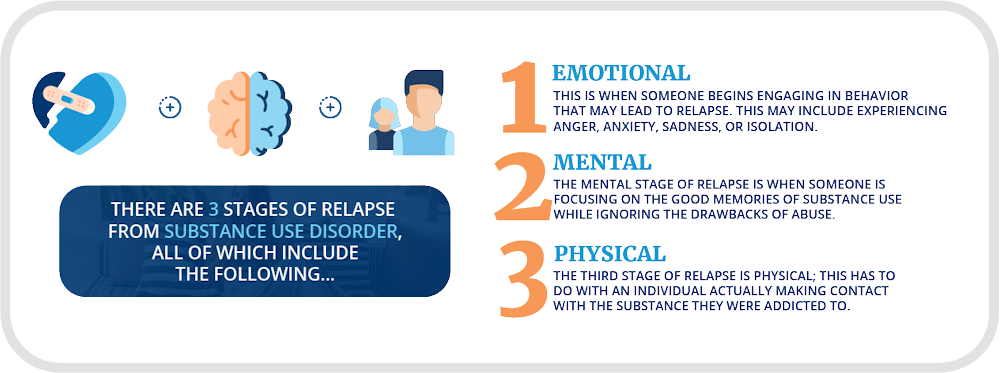Relapse Prevention: A Comprehensive Guide to Long-Term Recovery
What is a Relapse Prevention Program?

A relapse prevention program is a specialized intervention designed to help individuals maintain sobriety after completing initial addiction treatment. These programs consist of a personalized roadmap designed to identify high-risk situations, develop healthy coping strategies, and outline clear steps to take when facing triggers or cravings.
At Discovery Institute in Marlboro, New Jersey, our mission is to help each client develop a comprehensive relapse prevention plan tailored to their addiction. By addressing emotional, mental, and environmental factors that contribute to relapse, we empower our clients with the tools they need to stay focused on their sobriety goals and stay sober.
With over 50 years of addiction treatment experience, our New Jersey-based team is here to help you achieve and maintain long-term recovery. Learn how our addiction treatment programs in New Jersey can help you.
Relapse prevention programs serve as a bridge between intensive treatment and independent recovery. They provide structured support during the vulnerable transition period when individuals return to their daily lives.
Key characteristics include:
- Skills-based approach: Teaching practical coping mechanisms
- Cognitive-behavioral foundation: Addressing thought patterns and behaviors
- Personalized strategies: Tailored to individual triggers and circumstances
- Ongoing support: Continuous guidance beyond initial treatment
Research consistently demonstrates the value of structured relapse prevention programs. Studies show that individuals participating in comprehensive aftercare programs experience significantly lower relapse rates compared to those without continued support.
This approach acknowledges that recovery is a continuous process that requires sustained effort and professional guidance.
Understanding Relapse in Recovery
Relapse refers to the return to substance use after a period of abstinence. Understanding this phenomenon is crucial for developing effective prevention strategies. According to the National Institute on Drug Abuse (NIDA), relapse rates for substance use disorders range from 40–60%. This statistic places addiction recovery in line with other chronic medical conditions like diabetes and hypertension.
Modern addiction medicine views relapse not as a failure, but as a potential component of the recovery journey. This perspective helps reduce stigma and shame, encourages continued treatment engagement, promotes learning from setbacks, and emphasizes the chronic nature of addiction. Recognizing that relapse can be a part of the healing process allows individuals and their support systems to approach setbacks with greater compassion and resilience.
Several factors increase relapse vulnerability. Biological factors, such as brain chemistry changes during early recovery, can impact decision-making and impulse control. Psychological factors, including untreated mental health conditions, also heighten the risk. Social factors like a lack of support systems, as well as environmental factors such as exposure to triggers and cues, can further contribute to the likelihood of relapse. Understanding and addressing these risk factors is essential for long-term recovery success.
The Three Stages of Relapse

Relapse typically occurs in three distinct stages, each offering opportunities for intervention and prevention.
Duration: Weeks to months before substance use
Characteristics:
- Anxiety and irritability
- Mood swings
- Isolation from support systems
- Poor self-care habits
- Skipping meetings or therapy sessions
Intervention strategies:
- Recognize early warning signs
- Increase support group attendance
- Practice stress management techniques
- Maintain healthy routines
Duration: Days to weeks before substance use
Characteristics:
- Thinking about people, places, and things associated with past use
- Minimizing the consequences of addiction
- Bargaining and planning potential use
- Lying to others about thoughts and feelings
Intervention strategies:
- Challenge cognitive distortions
- Implement “urge surfing” techniques
- Increase accountability measures
- Seek immediate professional support
Duration: The actual return to substance use
Characteristics:
- Initial drug or alcohol use
- Potential for binge episodes
- Immediate health and safety risks
- Psychological distress and shame
Intervention strategies:
- Immediate medical assessment
- Crisis intervention services
- Return to intensive treatment if necessary
- Compassionate, non-judgmental support
What are Common Relapse Triggers and Warning Signs?
Identifying personal triggers is fundamental to effective relapse prevention. Understanding these factors enables proactive planning and intervention.
Environmental cues can powerfully activate cravings and urges:
- Physical locations: Bars, dealers’ neighborhoods, former usage locations
- Social situations: Parties, celebrations, stressful gatherings
- Objects and paraphernalia: Drug-related items, alcohol advertisements
- Sensory cues: Smells, sounds, or sights associated with past use
Emotional states frequently precipitate relapse episodes:
- Negative emotions: Depression, anxiety, anger, loneliness
- Positive emotions: Celebration, excitement, overconfidence
- Stress responses: Work pressure, relationship conflicts, financial problems
- Trauma responses: PTSD symptoms, anniversary reactions
Interpersonal factors significantly impact relapse risk:
- Peer pressure: Direct or indirect encouragement to use
- Social isolation: Lack of sober support networks
- Relationship conflicts: Family disputes, romantic problems
- Social anxiety: Discomfort in social situations without substances
Early recognition of warning signs enables timely intervention:
- Changes in sleep patterns or appetite
- Increased irritability or mood swings
- Withdrawal from family and friends
- Neglecting responsibilities or self-care
- Romanticizing past substance use
- Expressing hopelessness about recovery
CONTACT US
Find out how we can help
Our compassionate counselors are standing by to answer any questions you may have. After helping thousands of people over the last 50 years, we have the resources to help you and your family and all your individual needs.

Key Components of Effective Relapse Prevention Programs
Comprehensive relapse prevention programs incorporate multiple evidence-based components to address the complex nature of substance abuse treatment. At the Discovery Institute in Marlboro, NJ, these components are carefully tailored into individualized relapse prevention plans that reflect each client’s unique needs, history, and goals. By combining these therapeutic strategies into a customized approach, the team helps clients build a resilient foundation for lasting recovery.
One-on-one counseling offers personalized attention and targeted interventions, which are crucial to effective relapse prevention. Cognitive behavioral therapy (CBT) helps individuals identify and modify harmful thought patterns that may lead to substance use. Motivational Interviewing enhances intrinsic motivation and helps clients commit to meaningful change. Trauma-informed therapy creates a safe space to explore and heal from past traumatic experiences that may fuel addictive behaviors. Mindfulness-based approaches cultivate present-moment awareness and emotional regulation, which are essential tools for navigating high-risk situations.
Peer support and shared experiences offer unique therapeutic benefits that cannot be replicated in individual therapy alone. Process groups allow clients to explore their emotions and recovery journey in a supportive setting, helping them feel seen and understood. Skills-based groups teach practical coping strategies that can be applied in daily life. 12-step facilitation introduces clients to structured fellowship programs that offer long-term peer support beyond treatment. Family therapy is also incorporated to address relationship dynamics and improve communication patterns, strengthening the support system surrounding the individual.
Knowledge-based components enhance clients’ understanding of addiction and empower them to take control of their recovery. Education on addiction science helps clients grasp how brain chemistry changes during substance use and recovery. Trigger identification sessions allow clients to pinpoint personal risk factors and develop strategies for avoiding or managing them. Coping skills training equips individuals with healthy alternatives to substance use when faced with stress or cravings. Relapse prevention planning integrates this knowledge into actionable steps tailored to each individual’s circumstances.
When appropriate, medications can play a vital role in supporting long-term recovery. Medication-assisted treatment (MAT) is available for individuals with opioid or alcohol use disorders, reducing cravings and withdrawal symptoms. Mental health medications are carefully prescribed to treat co-occurring psychiatric conditions such as depression, anxiety, or bipolar disorder. Ongoing medical monitoring ensures that any health concerns are promptly addressed. Medication compliance support is also provided to ensure that clients remain consistent with their prescribed regimens.
Discovery Institute’s individualized relapse prevention plans integrate these key components into a cohesive and strategic framework for each client. By combining therapy, education, group support, and medical care, these plans empower individuals to identify challenges, build healthy routines, and stay committed to their recovery goals.
Evidence-Based Treatment Methods
Modern relapse prevention programs utilize scientifically validated approaches proven effective in maintaining long-term recovery.
CBT forms the foundation of most relapse prevention plans:
Core principles:
- Thoughts, feelings, and behaviors are interconnected
- Changing thought patterns can modify emotional responses
- Behavioral experiments test the validity of beliefs
- Skills can be learned and practiced
Specific techniques:
- Thought records: Identifying and challenging negative thoughts
- Behavioral activation: Scheduling pleasant and meaningful activities
- Exposure therapy: Gradually facing feared situations
- Relapse prevention planning: Developing specific coping strategies
MBRP combines traditional relapse prevention techniques with mindfulness meditation:
Key components:
- Mindful awareness: Observing thoughts and feelings without judgment
- Urge surfing: Riding out cravings without acting
- Acceptance: Acknowledging difficult experiences without avoidance
- Present-moment focus: Reducing rumination and worry
Research findings:
Studies demonstrate that MBRP participants show significantly fewer days of substance use and decreased heavy drinking at 12-month follow-up compared to traditional approaches.
This approach uses positive reinforcement to encourage sobriety:
Methods:
- Voucher systems: Earning rewards for clean drug tests
- Prize drawings: Opportunities to win prizes for meeting goals
- Privilege systems: Gaining increased freedoms with sustained sobriety
- Social recognition: Public acknowledgment of achievements
Involving family members and social networks enhances treatment effectiveness:
Components:
- Family education: Teaching about addiction and recovery
- Communication training: Improving family interaction patterns
- Boundary setting: Establishing healthy relationship limits
- Support network development: Building sober social connections
The Role of Aftercare in Relapse Prevention
Aftercare services provide crucial ongoing support as individuals transition from intensive treatment to independent living.
Research consistently shows that individuals who engage in aftercare services have significantly better outcomes:
- Lower relapse rates: Up to 50% reduction compared to those without aftercare
- Improved quality of life: Better relationships, employment, and health
- Enhanced coping skills: Continued development of recovery tools
- Sustained motivation: Ongoing support for recovery goals
Peer support programs:
- 12-step meetings (AA, NA, etc.)
- SMART Recovery groups
- Refuge Recovery meetings
- Online support communities
Sober living arrangements:
- Transitional housing programs
- Oxford Houses
- Therapeutic communities
- Supervised independent living
Alumni programs:
- Ongoing connection with the treatment facility
- Peer mentorship opportunities
- Social events and activities
- Continuing education workshops
Effective aftercare planning begins during initial treatment:
- Assessment of needs: Identifying individual risk factors and strengths
- Resource identification: Locating appropriate services and supports
- Goal setting: Establishing specific, measurable objectives
- Timeline development: Creating a structured progression of services
- Regular review: Adjusting the plan based on progress and changing needs
Creating Your Personal Relapse Prevention Plan
A personalized relapse prevention plan serves as a roadmap for maintaining sobriety and managing challenges in recovery.
Trigger identification:
- List specific people, places, situations, and emotions that increase risk
- Rate triggers by intensity and likelihood of encounter
- Develop specific strategies for each identified trigger
- Create alternative plans when primary strategies aren’t available
Coping strategies:
- Immediate responses: Quick techniques for managing cravings
- Short-term strategies: Activities for managing difficult days
- Long-term approaches: Lifestyle changes supporting sustained recovery
- Emergency protocols: Steps to take during crises
Support network:
- Primary contacts: Key people to call during difficult times
- Professional supports: Therapists, doctors, case managers
- Peer supports: Sponsors, recovery friends, group members
- Family supports: Trusted family members who understand recovery
Daily structure:
- Morning routines: Healthy ways to start each day
- Work/activity schedules: Maintaining productive engagement
- Evening routines: Relaxing, substance-free ways to end the day
- Weekend plans: Structured activities for higher-risk times
Regular review and updates:
- Weekly self-assessment of plan effectiveness
- Monthly review with counselor or sponsor
- Quarterly comprehensive plan revision
- Annual goal-setting and planning sessions
Practice and rehearsal:
- Role-playing challenging scenarios
- Mental rehearsal of coping strategies
- Gradual exposure to manageable triggers
- Building confidence through successful experiences
Documentation and tracking:
- Written plan accessible at all times
- Progress tracking and journaling
- Trigger and response logging
- Success celebration and recognition

Professional Support and Resources
Professional support plays a crucial role in successful relapse prevention planning, offering expertise, accountability, and specialized interventions.
Effective addiction recovery involves support from a variety of professionals, each contributing unique expertise. Addiction counselors are licensed specialists who provide individual and group therapy, conduct assessments, create treatment plans, and offer crisis intervention when needed.
Medical professionals such as addiction medicine doctors, psychiatrists, primary care providers, and nursing staff help manage both the physical and mental health aspects of recovery. Their role includes prescribing medications, monitoring health, and treating co-occurring conditions.
Case managers help coordinate care by connecting individuals with essential resources like housing, employment, and benefits. They also offer advocacy, assist with system navigation, and provide regular check-ins to track progress.
Peer recovery specialists are individuals in long-term recovery who offer mentorship, support, and a real-life perspective. They help bridge the gap between clinical treatment and the peer recovery community, offering encouragement and practical advice from lived experience.
When seeking a treatment program, it’s important to apply thoughtful research and evaluation criteria to ensure the highest level of care. Start by looking for accreditation, which indicates that the program meets established standards set by recognized organizations. Evidence-based practices are another critical component; these are scientifically validated approaches shown to be effective in treating substance use disorders. It’s also essential to check the qualifications of the staff, making sure that treatment providers are properly credentialed and experienced. Reviewing success rates, including outcome data and client testimonials, can provide valuable insight into the program’s effectiveness.
Before committing to a program, ask key questions to determine if it aligns with your specific needs. Inquire about the relapse prevention methods they use and whether they incorporate proven techniques. Ask how the program customizes treatment plans to suit individual circumstances, including the presence of co-occurring mental health conditions. Understanding their approach to involving family members in the treatment process can also be important, as family engagement often supports recovery. Finally, make sure to ask about aftercare and ongoing support services, which are crucial for maintaining progress after completing a program.
Insurance coverage:
- Most insurance plans cover addiction treatment services
- The Mental Health Parity Act requires equal coverage for mental health and substance use treatment
- Verify specific benefits and limitations with the insurance provider
- Understand copays, deductibles, and out-of-network costs
Financial assistance options:
- Sliding fee scales based on income
- State-funded treatment programs
- Nonprofit organizations offering scholarships
- Employee assistance programs (EAPs)
- Veterans Administration benefits for eligible individuals
Frequently Asked Questions
Relapse prevention programs specifically focus on maintaining sobriety after initial treatment completion. While regular addiction treatment addresses the immediate need for detoxification and stabilization, relapse prevention programs provide ongoing support and skill development for long-term recovery maintenance.
The duration varies based on individual needs, but research suggests that longer participation yields better outcomes. Many experts recommend at least 90 days of intensive programming, followed by ongoing support for 12-24 months or longer. Some individuals benefit from lifelong connections to recovery support services.
Yes, relapse prevention principles apply to all substance use disorders, including alcohol, opioids, stimulants, and other drugs. However, specific strategies may be tailored to address the unique challenges associated with different substances and individual circumstances.
Relapse should be viewed as a learning opportunity rather than a failure. Immediately contact your treatment provider or support person, seek medical evaluation if necessary, and work with your team to understand what led to the relapse and how to strengthen your prevention plan moving forward.
Research shows that online programs can be effective, particularly when they include interactive components, peer support, and professional guidance. However, the best approach depends on individual preferences, technology access, and specific treatment needs. Many people benefit from a combination of online and in-person services.
Family members can support recovery by:
- Learning about addiction and recovery processes
- Participating in family therapy or education programs
- Providing emotional support without enabling
- Maintaining healthy boundaries
- Celebrating recovery milestones
- Taking care of their own mental health and well-being
Medications can be an important component of relapse prevention for some individuals. Medication-assisted treatment (MAT) for opioid and alcohol use disorders has strong research support. Additionally, medications for co-occurring mental health conditions can reduce relapse risk by addressing underlying psychiatric symptoms.
Signs of program effectiveness include:
- Increased confidence in managing triggers and cravings
- Improved coping skills and stress management
- Stronger support networks and relationships
- Better overall mental and physical health
- Sustained periods of sobriety
- Achievement of personal recovery goals
- Reduced frequency and intensity of urges to use substances
Learn More About Our Relapse Prevention Program Today
If you or someone you love is ready to take the next step toward lasting recovery, the team at Discovery Institute in Marlboro, New Jersey, is here to help. Our individualized relapse prevention programs are designed to support you through every stage of the journey, offering compassionate care, proven strategies, and unwavering support. Contact us today to learn how we can help you build a strong foundation for long-term sobriety.

https://nida.nih.gov/publications/drugs-brains-behavior-science-addiction/treatment-recovery
https://pmc.ncbi.nlm.nih.gov/articles/PMC4553654/
https://www.recoveryanswers.org/resource/relapse-prevention-rp/
https://pmc.ncbi.nlm.nih.gov/articles/PMC5844157/
https://www.ncbi.nlm.nih.gov/books/NBK551500/
https://www.cdc.gov/stop-overdose/stigma-reduction/understanding-addiction.html


